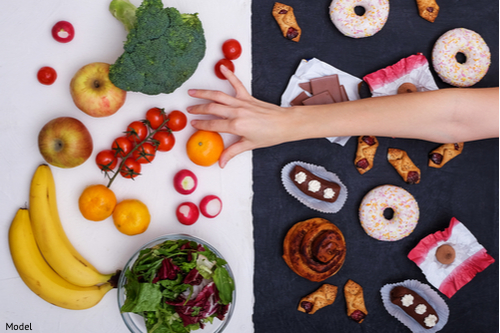5 Foods to Avoid When Dieting
Posted on: January 30, 2020 in Category: Anti-Aging Diet
3 Min Read

Starting a diet can be challenging. Therefore, one of the best ways to stick to it is to not think of it as a diet.
Instead, consider it a lifestyle change. After all, the results of a diet can easily be reversed if you return to unhealthy habits.
To be able to lose weight and keep it off, you will have to be consistent with your new healthy habits.
We have made a list of five food groups to avoid to help you get the most out of your diet.
1. Unhealthy Fats
It is important to understand that there are good fats and bad fats.
Fat is not universally bad. Your body needs fat to absorb nutrients, produce hormones, give you energy, and support cell growth.
What makes fat unhealthy is where it comes from and what type it is. Saturated and trans fats are the most unhealthy, and a consistently high intake of these fats can cause heart disease and high cholesterol.
On the other hand, healthy fats such as polyunsaturated, monounsaturated, and Omega-3 fatty acids—such as those found in plant and animal-based products—can lower your risk of heart disease, diabetes, and improved cholesterol levels.
2. Unhealthy Sugars
Similar to fats, there are different types of sugars, which your body needs for energy and protein production.
The best way to know what types of sugars there are is to check the nutrition label.
Natural sugars—that are found in fruits and milk—help to regulate blood sugar.
Added or processed sugars, such as white sugar and syrups, do not have any nutritional value and can spike blood sugar or cause diabetes.
3. Liquid Calories
Liquid calories, or high-calorie drinks, can be the number one cause of excess sugar and calorie intake.
As said before, your body needs sugars to function; however, the added sugar in drinks often causes you to go way over your necessary daily amount. They can also add unnecessary calories to your diet.
The average can of soda contains 30-40 grams of sugar, and the average 12-ounce bottle of juice contains at least 24 grams of sugar.
Water is your best choice when dieting. It helps to boost metabolism, cleanse the body, and, most importantly, water is sugar, salt, and calorie-free.
4. Foods High in Sodium
Salt and sugar are popular cravings for many people. Salt is found in virtually everything we eat. This is partially because it is a staple flavoring, but also because it is a primary part of food preservation.
While some salt is necessary, too much can cause your body to hold onto water. The excess water can cause your blood pressure to rise, which places strain on your vital organs.
5. Ultra-Processed Foods
Most foods require processing to be sold in stores.
Processed foods have been cooked, canned, frozen, packaged, or changed from their original nutritional composition. This can be done in several ways with a variety of different preservatives.
The most heavily processed foods are convenience foods or food that require little to no cooking or preparation, such as freezer dinners. While these foods are convenient, they are high in salt and sugar, and typically have little to no nutrition value due to their heavy preservation.
As a result, the consumption of these foods comes with minimal benefits.
Try to consume foods with as much nutrition as possible to make the most of your calorie intake and avoid excess fats.
Want to Learn More?
If you would like to learn more about lifestyle changes, the Sand Institute offers many individual weight loss remedies that can be customized for you. Please contact Dr. Sand by calling her Los Angeles office at (310) 441-2263 or her Paramount office at (562) 297-4068.